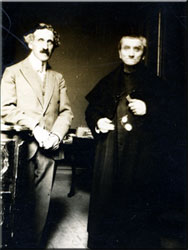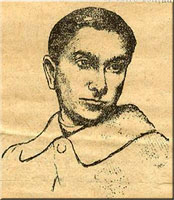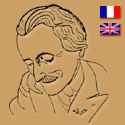| Louis the Cardonnel |  |
| ... I had, at the galleries of the Odéon, with my savings as a normalien, bought this volume, with a yellow cover on which there was only the simple word “Poèmes”, above the signature of Louis Le Cardonnel. Yes, but what poems! The ardor in the measure, the fervor in the harmony, and, as the poet was to say later, the flame in the crystal! |
I speak to you in the midst of an eternal present Under the divine breath, he will bring her back to life,
|
 Louis the Cardonnel 1862-1936 |
Louis le Cardonnel invited me to celebrate the Passover with him, at the table of Don Grégorio Frangipani, his Benedictine host, and in the company of his nephew Agenore, to whom he devoted several poems of his Carmina Sacra. He was composing them on that date, and while the following week we walked the streets and paths together, he recited most of them to me, in his voice quivering and tense like a violin string … Cloister of St Peter where he welcomed me on Holy Saturday, to the sound of the bells returning from Rome, low church of Saint Francis where we were in ecstasy in front of the four divine frescoes by Giotto, terrace of Saint Clare d ‘ where one dominates the green valley of Umbria, small convent of Saint-Damien nestled among the olive trees, old empty palaces, where resounded our voices which evoked the heroes and the saints, impassioned talks of a young poet and of an elder who shows him the way, alternating poems in the language of Dante and that of Lamartine without forgetting that of Mistral ... |
 Louis the Cardonnel 1862-1936 |
His childhood passed in Valencia, serious and grave, almost austere. When he was 12 he read Kant and Pascal “he passionately loves poetry and even metaphysics, the most abstruse, that which has a mystical tinge above all. One day when the great tragedian Agar is giving a performance at the Valence theater, he gets to speak to her and presents her with a few stanzas. She gives him a place. And in the evening, to the great astonishment of the principal who attends the show, she declaims, during an intermission, the verses of a college student whose future glory she predicts, and who is called Louis Le Cardonnel.
It happened to him at the same time, to leave the paternal home for some extraordinary escape. He was leaving for the Holy Land; he slept in the meadows, the stacks of straw, the confessionals, wrapped in a blanket, his loins girded with a rope. We find him in a cave near Valencia where he had undertaken to lead the life of an anchorite, or else, after two or three days of absence, he is brought home exhausted, sometimes ill. |
Later a poet monk, in the manner of Saint Francis, he will go from road to road, from convent to convent, poor, simple and blooming like the lily of the field, sure of his mission and of the assistance of the Most High.
“I walked through the various circles of the time, but eager to unite truth and beauty in one love, I came out disappointed.
Too much aesthetics, not enough inner life. “
The Symbolist friendship lives on in this poem he dedicated to the memory of Charles Guérin:
| And to show you my pain, I wanted, Before May Charming has flowered the arbor, Dedicate to your name as a poet and a chosen one This discreet, tenderly fraternal flower. Under the divine breath, he will bring her back to life, I will open paths to divine Beauty,
|
“I admire more and more the providential design which brought me to this mystical city; mystical, I say, but also classic. Nowhere is this mysterious harmony of what is most indefinite and what is most precise, of what gives wings to the soul to carry it beyond the world and what retains it in the contemplation of Beauty, was only realized in Assisi. The verses of Virgil alone give in poetry, perhaps, this unique and perfect joy, and Saint Francis and like his country. He tends wildly towards God without forgetting to see the charm of creatures. May the green olive trees, the sky, the earth, the water, Everything speak to them at once of the great Poverello! “(Letter to Armand Praviel January 1908 published in the Latin Soul, February 1908.)
| Harmonious child, sound creature Let the great pines cradle in their warm thickness; Golden musician, whom I call my sister, O cicada, in vigorous vigor, who equals you? Vibrant, crackling, exultant cicada, Your tireless voice is the midday hymn.
(The poem of St. Francis to Sister La Cigale from Carmina Sacra by Louis le Cardonnel) |
Louis le Cardonnel told me how he had received a message from Saint Francis, during one of his last rail journeys, on a summer afternoon like the one he sang …
As the train approached Tarascon, a cicada landed on his hand. He then spoke to her as Saint Francis would not have failed to do, and he made his fellow travelers admire her who, perhaps, really saw, thanks to him, a cicada for the first time. At a station, a little before Tarascon, a heavyweight burst into the wagon, which jostled my brother and made the cicada fall; my brother picked her up so bruised that she seemed dead and, placing her back on his hand, resumed talking sweet things to her. He had, I imagine, to repeat to her the verses which he had placed in the mouth of Saint Francis addressing the cicada. As the train reached the first houses of Tarascon, the seemingly dead cicada flew off towards the oldest of these houses. And my brother had no doubt that that day François would indicate to him by this message the house where his mother was born, who was, as we know, Provencal and originally from Tarascon. (Georges Le Cardonnel: My brother and me. The correspondent, July 10, 1936.P.66)
| At the Palais du Roure in 1946…. I always see this present, unforgettable in our eyes. Cardonnel who alternately inhabited the two wings of Roure, and who died in that of Petrarch. During the last three years of his life, he left such a strong mark on the atmosphere of Roure that it is still imbued with his memory.
I keep the memory of Louis le Cardonnel of the one who most strongly gave me the image of the poet, so out of time and almost of space, living along a fourth spiritual dimension, unsuited to everyday life. , but letting fall from a sort of interior Sinai “the vast flashes of his lucid mind” For what remains most essential of his work and of his life is the affirmation that all poetic creation tends to worship divine. Cardonnel is not a priest who has written verses to amuse himself on leisure evenings, he is a poet who is thirty-four years old has become a priest to go to the end of his effort, to fully realize his poetic ideal, to remake in his person, at the end of the XIXth century “this ancient union of the poet and the priest. ” Letter from Louis le Cardonnel dated April 3, 1934 written from Roure to Emile Ripert “It was in this unforgettable Assisi that our friendship was born. She cannot die, for she is established on a plane that none of the vicissitudes of this world will ever reach, it is on a plane that we have loved and understood each other. Remember, let us remember together … Review in spirit this altar in the crypt of Assisi where you received Communion from my hand .. That morning I think all the dead poets were there, invisibly…. “ Provence is essentially Franciscan: it is because it gave Saint Francis the mother who made him this ardent apostle, this sacred poet, this knight, this juggler of Christ that he was; it is because it unites the love of nature with that of God, because it is sober and poor in its stripped landscapes, of which light is the only richness. Provence will therefore speak to you of Assisi
|
|
Louis le Cardonnel documentation: Foggy morning |

